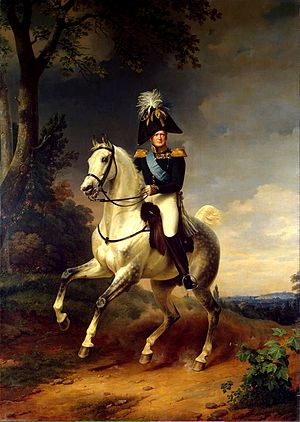Alexander I of Russia (Russian: Александр I Павлович, Aleksandr I Pavlovich) (23 December [O.S. 12 December] 1777 – 1 December [O.S. 19 November] 1825),. (Russian: Александр Благословенный, Aleksandr Blagoslovennyi, Alexander the Blessed), served as Emperor of Russia from 23 March 1801 to 1 December 1825 and the first Russian King of Poland from 1815 to 1825. He was also the first Russian Grand Duke of Finland and Lithuania.He was born in Saint Petersburg to Grand Duke Paul Petrovich, later Emperor Paul I and succeeded to the throne after his father was murdered. He ruled Russia during the chaotic period of the Napoleonic Wars. As prince and tsar Alexander used liberal rhetoric to consolidate his popularity, but actually continued Russia's absolutist policies. In the first years of his reign, he initiated some minor social reforms and, in 1803-04, major, liberal educational reforms. He promised constitutional reforms and a desperately needed reform of serfdom but made no concrete proposals and nothing happened. In the second half of his reign he was increasingly arbitrary, reactionary and fearful of plots against him; he ended many earlier reforms. He purged schools of foreign teachers, as education became more religiously oriented as well as politically conservative.His foreign policy was erratic; his allies never fully trusted him. At first he tried to mediate between France and Britain, but misunderstood his minor role. In 1805, he joined Britain in the War of the Third Coalition against Napoleon, but after the massive Russian defeat at the Battle of Austerlitz he switched and formed an alliance with Napoleon by the Treaty of Tilsit (1807) and joined Napoleon's Continental System. He fought a small-scale naval war against Britain, 1807-12. He and Napoleon could never agree, especially about Poland, and the alliance collapsed by 1810. The tsar's greatest triumph came in 1812 as Napoleon's invasion proved a total disaster for the French. As part of the winning coalition against Napoleon he gained some spoils in Finland and Poland. His foreign and domestic policies were reactionary after 1815. He formed the Holy Alliance to suppress revolutionary movements in Europe that he saw as immoral threats to legitimate Christian monarchs. He helped Austria's Klemens von Metternich in suppressing all national and liberal movements.Alexander died without issue and after great confusion that included the failed Decembrist revolt of liberal army officers he was succeeded by his younger brother, Nicholas I.

Fin de la actividad (año)
1825
Alias
Pavlovich, Aleksandr I
Fecha de nacimiento
1777-12-23
Año de nacimiento
1777
Fecha de defunción
1825-12-01
Año de defunción
1825



Aipatu
0